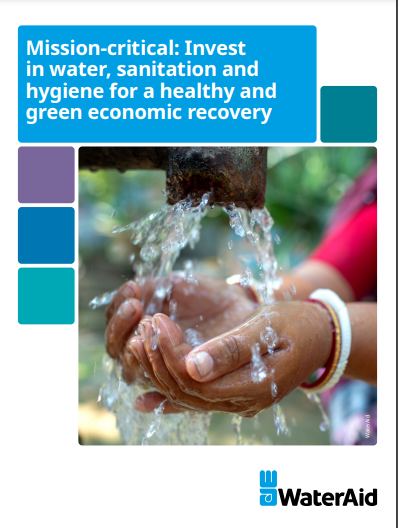New report: Huge economic benefits of USD trillions if investments in water/sanitation/hygiene are made
- July 12, 2021
- Posted by: Elaine Coles
- Category: Environmental, Global, Investment and Finance, Water Issues, Africa, Asia, Europe

Developing country economies would be boosted by trillions of dollars over the next two decades if clean water, toilets and hygiene were brought to everyone, according to a new report from international aid agency WaterAid.
Ensuring everyone everywhere has access to even basic water, hygiene and toilets – which could mean a well within a 15 minute walk, a household toilet and soap and water to wash hands with – would bring returns of up to 21 times their cost, found Vivid Economics, who conducted the research and analysis that feeds into the report.
Mission critical: invest in water, sanitation and hygiene for a healthy and green economic recovery – shows that reaching the levels of access defined by the UN’s Sustainable Development Goals could unlock huge sums:
- Ensuring everyone has a toilet where waste is safely managed can yield US$86 billion per year in greater productivity and reduced health costs amongst other benefits.
- Ensuring everyone has somewhere to wash their hands with soap and water can yield $US45 billion per year.
- Ensuring everyone has a tap at home can yield $US37 billion per year.
The report is being published just days before G20 Finance Ministers and Central Bank Governors meet in Venice to discuss ensuring global economic prosperity in the wake of the pandemic and in the face of climate change.
WaterAid is calling on G20 Finance Ministers to ensure WASH is central to plans for developing countries to recover economically from the pandemic and protect themselves against the impacts of climate change.
Investment in WASH within healthcare centres, for example, was highlighted by the G20 as an essential measure for protecting the world’s poorest health systems in a declaration in May. This requires an investment of $6.5 billion – which finance ministers could discuss providing this week.
They are also set to discuss debt relief and the issue of IMF funding in the form of Special Drawing Rights (back-up funds) for the world’s poorest countries – whose economies have been impacted disastrously by the pandemic – which could enable spending on essential and economically critical public services like WASH.
WaterAid’s report also shows that investing in WASH is crucial for building climate resilience; a key priority for the G20 and COP26 set to take place in Glasgow in November.
Other key findings of the report include:
- Protecting water and sanitation infrastructure from worsening flooding is one of the best ways we can protect the world’s most vulnerable people from the impacts of climate change – for every US Dollar spent on strategic flood resilience upgrades, US$62 in flood restoration costs can be avoided, as well as preventing life-threatening contamination of drinking water sources.
- The provision of even just a community water pump or well can give women and girls the equivalent of 77 million working days per year that they currently spend collecting water; whilst upgrading to a tap in every house would free-up 122 million working days that are annually stolen from them. The impact on the lives, prospects and freedom of women and girls, as well as a country’s economic success, would be transformative.
- Achieving the UN targets on sanitation could prevent up to six billion cases of diarrhoea and 12 billion cases of parasitic worms between 2021 and 2040. Diarrhoea kills more than 70,000 children each year, and hookworm – just one type of parasitic worms – affects 500 million people each year, meaning that every year four million years are lost to people through ill-health or shortened lives.[1]
- Universal access to hand washing can reduce cumulative infections in a respiratory disease epidemic even if no other actions are taken – saving days that COVID-19 shows can be vital for response and containment efforts to limit the spread of infections.
- Tim Wainwright, Chief Executive, WaterAid, said:
“Our report demonstrates just how important it is that the UK Government reverse the cuts to aid spending on water and sanitation. It confirms, unquestionably, that investment in water, sanitation and hygiene is an extremely cost-effective defence against the twin threats of Covid-19 and the impacts of climate change.
“Water and sanitation have been sidelined for far too long, their value overlooked, trapping millions in poverty. Our research shows that it’s an extremely cost-effective investment. Ensuring everyone everywhere has access to even basic water, hygiene and toilets would bring returns of up to 21 times the cost.
“If the Government and its G20 counterparts are intent on building a strong, sustained recovery, then investing in water and sanitation is, without a doubt, one of the best buys they could make.”
Click here to download Mission critical: invest in water, sanitation and hygiene for a healthy and green economic recovery
